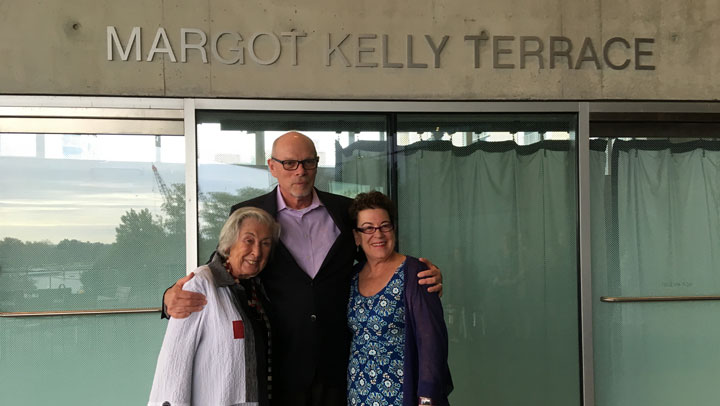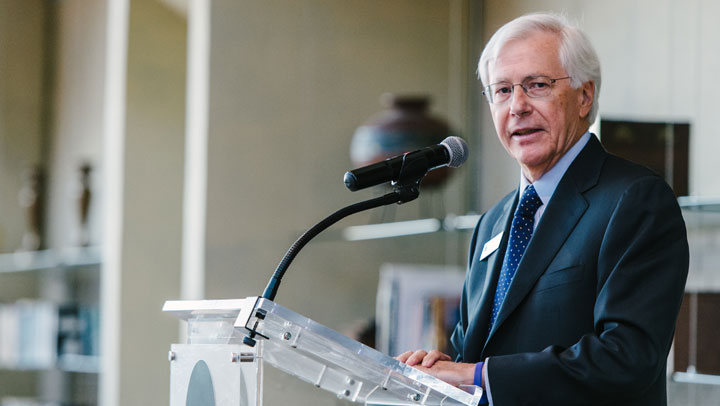In The Round: January 2020
In the Round with Executive Producer Edgar Dobie
Edgar Dobie introduces the first video edition of In the Round.
-

One Donor's 70-Year Love Affair with Arena Stage
"Not only is Arena better for Margot’s support, but this city has enormously benefited from her hard work."
Written by Janice L. Kaplan
Like many Arena Stage patrons, Margot Kelly has favorite Arena moments: seeing Frances Sternhagen in The Country Wife, watching Oklahoma! for the first time at the opening of Arena Stage at the Mead Center for American Theater, seeing Tony award-winner Ben Platt in Dear Evan Hansen before it moved to Broadway and being on hand for Arena’s “joyfully intoxicating” production of August Wilson’s Jitney, which recently opened a season-long festival celebrating the Pulitzer Prize-winning giant.
There’s more. Margot has attended performances in Arena’s multiple homes; was in the audience for both the pre-Broadway run of The Great White Hope with James Earl Jones and Jane Alexander in the 1960s as well as again in 2000 during Arena’s 50th anniversary year; and she remembers when Arena was the first theater to win a Regional Theater Tony Award.
Margot recently marked her 70th year as an Arena supporter. Currently a member of its Board of Trustees, she also served on the committee that selected the design for Arena’s Mead Center renovation. In 2015, Margot presented a major gift to Arena’s Ovation Campaign — an endowment fund that assures the theater’s future — after which Arena renamed its beautiful roof terrace the Margot Kelly Terrace.
Arena’s impact, Margot says, is not only in its top notch productions, but its commitment to introducing young people to the theater, serving as a valuable neighborhood resource in what was once known as “the forgotten quadrant,” as the anchor of the development that has grown up around the theater in recent years and as a place that nurtures a diverse community of emerging playwrights such as Karen Zacarías and Mary Kathryn Nagle, among many others.In October, Margot celebrated her 95th birthday at Arena Stage surrounded by family and dear friends, including Artistic Director Molly Smith and Executive Producer Edgar Dobie.
"Margot is fierce, formidable, generous and wise," said Molly in her toast.
Like Molly, Margot is frequently described with bold adjectives such as “maverick” and “gutsy.” Not only are the two women friends, they are kindred spirits (and fellow poker players).
A native of Germany, Margot was introduced to the theater and opera from a young age. After surviving the horrors of World War II in Germany, she arrived in Washington, D.C., on April 1, 1950, three months before Arena opened its doors. Hardworking and beautiful (she was regularly mistaken for Elizabeth Taylor), Margot fell into a career in real estate and was successful not only at selling properties but as a savvy investor — beginning in Burleith, Glover Park and Georgetown and eventually on Capitol Hill. Long before 8th Street Southeast became a destination for foodies flocking to places like Rose’s Luxury, Margot saw the potential in the distressed commercial strip down the street from the Marine Barracks. As a founder of the Barracks Row Main Street, she has worked tirelessly for more than 20 years to preserve and enhance the historic commercial corridor and revitalize its businesses.
Margot has witnessed great change over seven decades in Washington. When she first arrived, she recalls thinking “this city is boring.” She discovered Arena was the exception when she stumbled upon “this funny little place in this kooky neighborhood.” She is referring to The Hippodrome, the former burlesque and movie house on 9th Street Northwest, which was Arena’s first home and the District’s first integrated theater. Zelda Fichandler, Arena’s legendary co-founder, insisted on inclusiveness and accessibility, which have been a priority ever since.Today, Margot’s life is full and productive. Splitting time between her Washington and Rehoboth communities, she continues her work in real estate and enjoys her many friends as well as Washington’s vibrant performing arts opportunities. Indeed, Margot has enjoyed a front row seat to all the magic that is Arena Stage since its very beginning.
-

New Board Chair: Drawn to Arena's Commitment to Diversity and Democracy
“Arena’s board chose an all-star to guide us with confidence upwards.”
Written by Janice L. Kaplan
Taking the reins from Judith Batty, Arena Stage has a new Board Chair, Decker Anstrom, though he’s hardly new to Arena. Decker and his wife, Sherry Hiemstra, went on some of their first dates at the theater in the 1970s, taking in such classics as Death of a Salesman and Our Town. Forty years later, Arena Stage is still one of their favorite destinations.
Decker has had a long career in public service and in the communications industry, including serving as president of the National Cable Television Association, president of Landmark Communications and chairman of the Weather Channel Companies, as well as staff positions in the Carter White House and Office of Management and Business. He is currently on the board of Discovery Communications. Known as a good listener and problem solver, he is a chief executive who gets things done.“Decker is a masterful leader,” said Arena Stage Executive Producer Edgar Dobie. “His executive experience in government, politics and for-profit business leadership provides a deep well of expertise which has already served our enterprise so well. Add to that his grace, generosity and great sense of humor. Arena’s board chose an all-star to guide us with confidence upwards.”
Work took Decker and his family away from the District for nearly a decade. Upon returning in 2010, they found a very different city, one teeming with theaters. Another sign of the changing times: in the past, local theaters had to import talent from New York; now there was a large pool of gifted actors right here in Washington.Their return also coincided with the unveiling of the Arena Stage at the Mead Center for American Theater and the opening of Artistic Director Molly Smith’s groundbreaking revival of Oklahoma! with its multicultural casting. That electric night “captured every reason we came back to Washington,” Decker says. They immediately signed on as subscribers.
His love of theater doesn’t come as a surprise, given Decker’s upbringing. He grew up in North Dakota and Minnesota surrounded by books and records in a household that didn’t own a television. His parents, who were both high school teachers, read poetry out loud to each other. For entertainment, the family listened to musicals and Shakespeare’s plays on their record player. While at Macalaster College in St. Paul, Decker became a regular at the Guthrie Theater which, like Arena, was part of the American regional theater movement of the 1960s.
At the Guthrie, Decker “came to understand the power of live theater to tell stories.” At Arena, he has learned the value of focusing on diversity in the theater: in its actors, its playwrights, audiences and choice of plays. That commitment to inclusiveness dates to Arena’s early days, when co-founder Zelda Fichandler welcomed everyone, regardless of their background, into its theater-in-the-round.
One need only look at the current season for evidence that legacy lives on. Consider the diverse lineup of plays, from August Wilson’s Jitney to Ken Ludwig’s World War II love story Dear Jack, Dear Louise to Right to be Forgotten, an allegory about privacy, social media and human forgiveness in the age of the Internet. “Over the years,” Decker points out, “Arena has learned if you have diverse offerings, diverse audiences will come.”
They may also come because of Molly Smith, who Decker calls one of the great American artistic directors working today. “What strikes me most is her courage,” he says. “She is willing to experiment and provide a provocative and important look at American history.”
“As Board Chair, one of my highest priorities is to reinforce Arena’s commitment to be a voice for democracy and diversity,” he adds. How does Arena’s creative team accomplish this? “By not being content with the status quo. By staging productions that are challenging. By being a player in the conversations taking place in this city and engaging with the community” — through post-show discussions, Civil Dialogues on social and political topics and educational programming for all ages. “We also need to continue to focus, under the leadership of our Executive Producer Edgar Dobie, on ensuring that Arena is financially stable and resilient, and build on seven straight years of balanced budgets,” Decker said. “And we need to address issues that affect our audiences and actors, particularly parking and artist housing.”
Decker is grateful for the opportunity to serve on Arena’s board and work with board members who are “smart, intellectually curious individuals who care about Arena’s legacy and its future. We may have different ways of thinking, and that helps us help Edgar and Molly serve the interests of our diverse audiences and our Southwest and DMV communities,” he says. In addition to volunteering his time, Decker and Sherry have made significant financial contributions to Arena’s annual fund and Ovation campaign, a $70 million project to ensure the vibrancy and security of Arena Stage and the art that it fosters for decades to come.
“Arena has remarkable patrons and donors,” Decker points out. “They are the heart of the theater. They buy subscriptions, donate year after year and volunteer as ushers. When he asks supporters and volunteers what motivates them, he frequently hears “they love this theater and want it to be around forever.”
Decker couldn’t agree more.